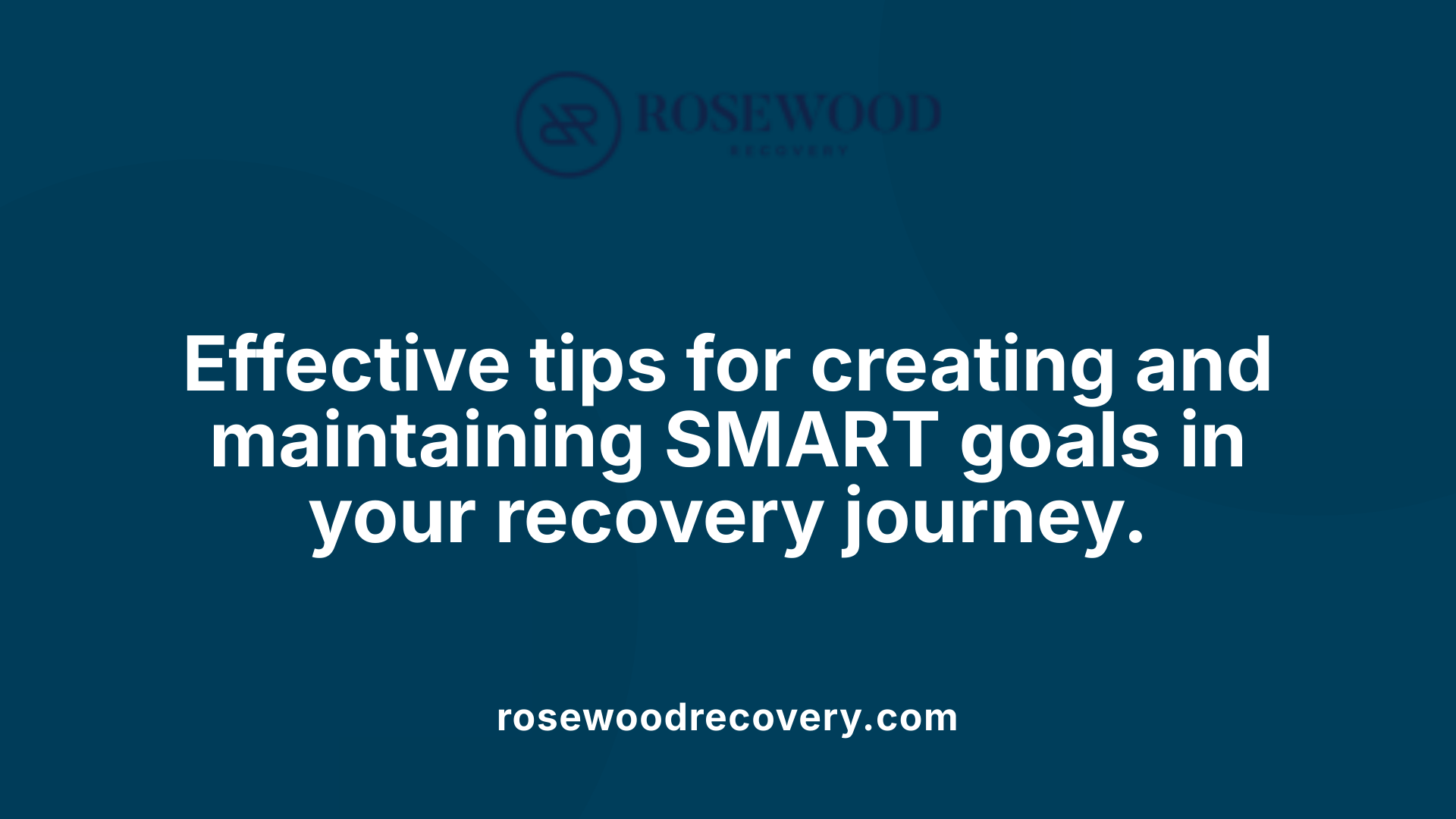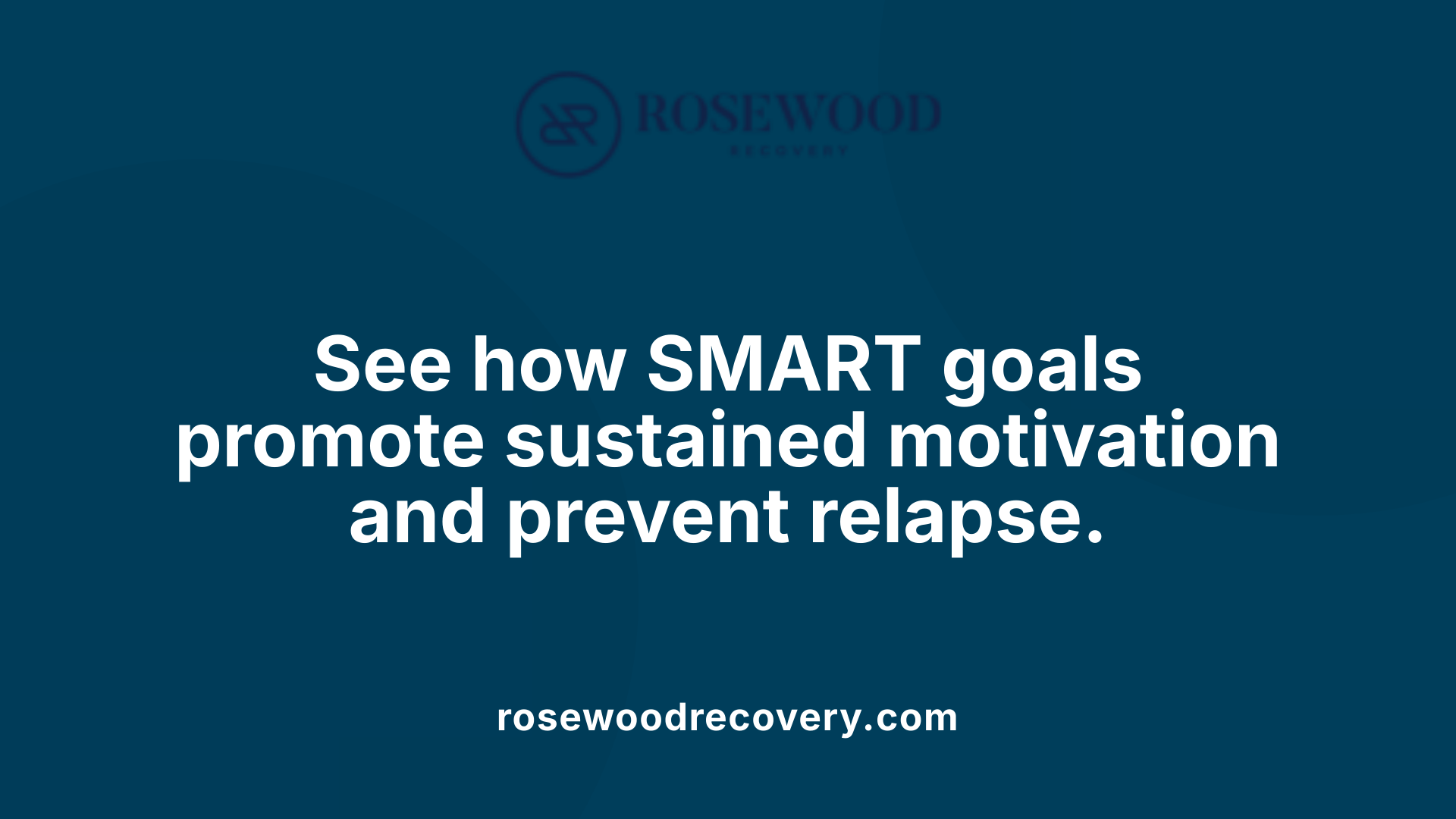Understanding SMART Goals and Their Integral Role in Addiction Recovery
In addiction recovery, achieving and maintaining sobriety involves more than just abstinence — it requires a strategic approach to personal growth and change. One widely endorsed method is the use of SMART goals, a structured framework that helps individuals create clear, actionable, and manageable objectives. This article explores the concept of SMART goals within addiction recovery, explaining their significance, how to develop effective goals, and their impact on long-term sobriety.
Defining SMART Goals in Addiction Recovery

What are SMART goals in the context of addiction recovery?
SMART goals are structured objectives designed to help individuals in recovery set clear, practical, and attainable steps toward their sobriety and overall well-being. The acronym SMART stands for Specific, Measurable, Achievable, Relevant, and Time-bound, which collectively provide a comprehensive framework for goal setting.
Specific goals clarify exactly what needs to be achieved. For example, rather than saying "I want to quit drinking," a specific goal would be "Attend three support group meetings weekly." This clarity helps individuals understand precisely what they are working toward.
Measurable goals include criteria to track progress. This could be counting days sober, the number of therapy sessions attended, or milestones like reducing substance intake. Quantifying progress keeps motivation high and makes it easier to see improvements.
Achievable goals are challenging yet realistic within an individual's current resources and circumstances. For example, aiming to attend a support group twice a week is attainable for many, but setting an overly ambitious target might lead to frustration.
Relevant goals align with the person's recovery needs and personal values. For instance, reconnecting with family or developing coping skills directly supports sobriety and emotional health.
Time-bound goals have deadlines that create a sense of urgency and keep individuals focused. An example would be "Complete a relapse prevention workshop within two months."
How SMART goals provide clarity and structure to the recovery process
Incorporating SMART goals into recovery creates a clear roadmap. This structured approach breaks down long-term ambitions into manageable, actionable steps. It helps individuals stay focused and organized, reducing the overwhelm often felt when facing significant lifestyle changes.
Having defined deadlines and measurable objectives encourages accountability. Whether working with a counselor, sponsor, or peer group, these goals foster ongoing feedback and adjustments as needed.
Moreover, SMART goals motivate sustained effort by enabling individuals to celebrate small successes along the way. This reinforcement enhances confidence and contributes to long-term commitment.
Together, these features of SMART goal-setting make the recovery journey less intimidating and more attainable. They help build a supportive framework that guides individuals from initial sobriety toward lasting change, emphasizing progress, personal growth, and resilience.
The Significance of SMART Goals in Recovery

Why are SMART goals important in addiction recovery?
SMART goals serve as an essential tool in addiction recovery by offering a clear and organized approach to setting objectives. They break down complex recovery journeys into manageable, concrete steps that prevent individuals from feeling overwhelmed. When goals are defined as Specific, Measurable, Achievable, Relevant, and Time-bound, it becomes easier to track progress and celebrate small victories, which boosts confidence.
This structured framework also fosters accountability, encouraging individuals to stay committed to their recovery plans. Regular review and adjustment of goals ensure flexibility, accommodating setbacks like relapses or evolving recovery needs. Furthermore, SMART goals promote collaboration with support networks such as therapists, family, and peer groups, creating a foundation of encouragement and reinforcement.
Overall, integrating SMART goals into recovery strategies helps sustain motivation, reduce frustration, and enhance engagement with treatment activities. This systematic approach aids individuals in creating realistic, purposeful pathways to sobriety and long-term wellness. As a result, SMART goals not only support immediate recovery efforts but also contribute to the prevention of relapse by maintaining focus and momentum over time.
Practical Strategies for Developing SMART Goals

How can I effectively set SMART goals for my recovery process?
Setting effective SMART goals is a crucial step in navigating recovery successfully. Begin by making your goals specific; clearly define what you want to accomplish, including details such as who will be involved (like support groups or therapists), what actions you will take (such as attending meetings or practicing coping skills), where these activities will happen, and why they are important for your recovery.
Next, ensure your goals are measurable. This involves including quantifiable elements—for example, aiming to attend support group meetings at least twice a week or practicing mindfulness exercises daily. Measuring progress keeps you motivated and provides a clear sense of achievement.
Goals should also be realistic and attainable. Break larger aspirations into smaller, manageable steps. This approach helps prevent overwhelm and builds confidence as you accomplish each milestone. For example, if your aim is to abstain from substances, setting a goal to do so for a week before extending it makes the process more approachable.
Relevance is another important factor. Align your goals with your current recovery stage and personal values. If you’re working on building trust with family, goals related to reconnecting or having honest conversations are relevant to your overall plan.
Lastly, always set a deadline—this adds a sense of urgency and accountability. For instance, you might set a goal to find a new apartment within a month or complete a particular therapy program in three months.
Regular review and adjustment of your goals are vital. Celebrate small wins to boost motivation and reassess your objectives as circumstances change. This flexibility helps maintain steady progress and reinforces your commitment to a healthier, substance-free life.
Examples of SMART Goals in Recovery Contexts

Sample goals across health, relationships, finance, and personal growth.
In recovery, setting well-crafted SMART goals can significantly enhance progress across various areas of life. For health, a goal might be to exercise for 30 minutes, four times a week, helping to improve physical well-being and reduce stress. In relationships, an individual could aim to have an honest conversation with a family member within the next month, fostering trust and emotional healing.
Financial goals may include saving a specific amount of money weekly toward sober milestones or reducing spending on alcohol or substances. Personal growth goals could involve engaging in a creative activity daily, such as drawing or writing, for four months, which helps channel emotions positively and build confidence.
These diverse goals provide structure and motivation in multiple aspects of recovery, supporting a balanced and healthier lifestyle.
How specific goals motivate and guide recovery efforts.
Clear, specific goals serve as direct roadmaps, helping individuals focus their efforts on tangible outcomes. By stating exactly what needs to be done, such as attending weekly support meetings or practicing mindfulness daily, individuals can track their progress and stay motivated.
Specificity helps prevent ambiguity, reducing confusion or overwhelm often encountered in recovery. When goals answer the questions of who, what, where, when, and why, they become more concrete, actionable, and easier to commit to.
This clarity enhances accountability, encourages consistent effort, and ultimately leads to more sustained recovery successes. Setting specific goals also makes it easier to celebrate small victories, boosting self-esteem and reinforcing healthy habits.
How does setting these goals help in recovery?
Establishing SMART goals aligns personal motivation with achievable steps, providing a clear pathway out of dependence and toward healing. They act as milestones that mark progress, helping individuals stay focused and resilient amid challenges.
By regularly reviewing and adjusting these goals as needed, recovery becomes a dynamic, personalized process. This fosters a sense of control and purpose, reducing frustration and emotional overload.
In summary, SMART goals in recovery are not just about setting targets but creating a supportive framework that guides, motivates, and sustains individuals on their journey to sobriety and personal growth.
Long-Term Impact of SMART Goals on Sobriety and Recovery

How do SMART goals support ongoing motivation and prevent relapse?
SMART goals are essential tools in maintaining long-term sobriety. They offer a clear roadmap by breaking down the recovery process into specific, measurable, attainable, relevant, and time-bound objectives. This structure helps individuals stay focused and motivated, as they can see tangible progress along their journey.
By setting small, achievable targets—such as attending a support group weekly or practicing coping techniques daily—people in recovery experience regular wins that boost confidence and reinforce their commitment to sobriety.
Furthermore, SMART goals help identify potential relapse triggers early. For example, a goal to avoid certain social settings or to practice stress management techniques can be monitored and adjusted. This proactive approach allows individuals to develop resilience and adapt their strategies to changing circumstances.
Having milestones and deadlines also encourages sustained effort over time. When progress becomes apparent, motivation grows, reducing feelings of frustration or overwhelm that might lead to relapse. Overall, SMART goals foster a sense of purpose, accountability, and self-efficacy—crucial elements for long-lasting sobriety.
The importance of review, adjustment, and professional guidance
Regular review and flexibility are vital elements of successful SMART goal implementation. Recovery is dynamic, and circumstances can change, so goals must be revisited periodically.
People should assess their progress, celebrate achievements, and identify areas needing improvement. For instance, if a goal to attend therapy twice weekly becomes overwhelming, it can be adjusted to once a week, maintaining progress without undue burden.
Seeking professional guidance from therapists, support groups, or addiction specialists enhances the effectiveness of goal setting. These professionals can help refine goals, provide motivational support, and offer strategies to overcome obstacles.
Adjustments should be based on honest self-assessment and feedback from trusted support networks. This ongoing process ensures that goals remain relevant, realistic, and aligned with evolving recovery needs.
By combining structured goal setting with regular reviews and expert input, individuals are better equipped to maintain sobriety, build resilience, and sustain their recovery long after initial treatment.
Harnessing SMART Goals for a Successful Recovery Journey
Implementing SMART goals in addiction recovery empowers individuals to take charge of their journey with clarity, purpose, and resilience. By establishing well-defined, realistic, and time-specific objectives, recovering individuals can navigate challenges more effectively, stay motivated, and build confidence through measurable progress. Regular review and adjustment of these goals ensure that recovery remains a dynamic and adaptable process, fostering long-term sobriety and personal growth. Ultimately, SMART goals serve as a vital tool for transforming hope into tangible achievements, guiding individuals toward a healthier, substance-free life.




